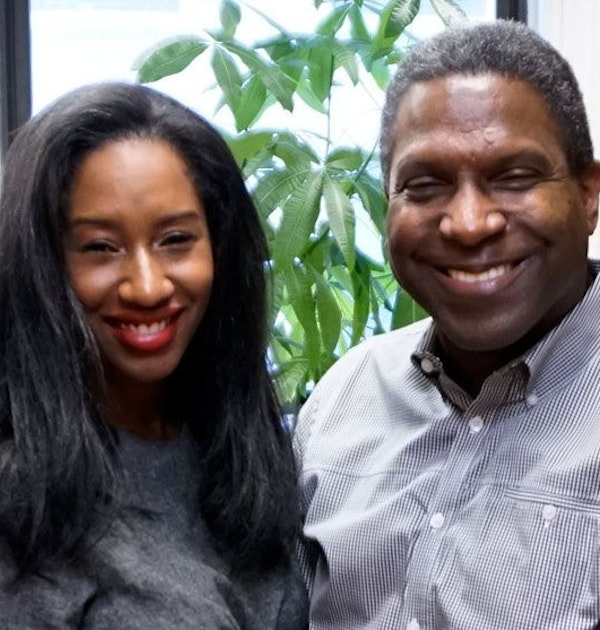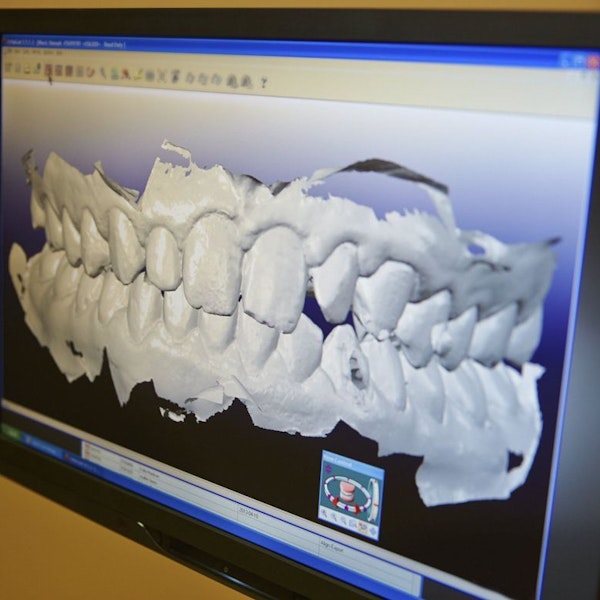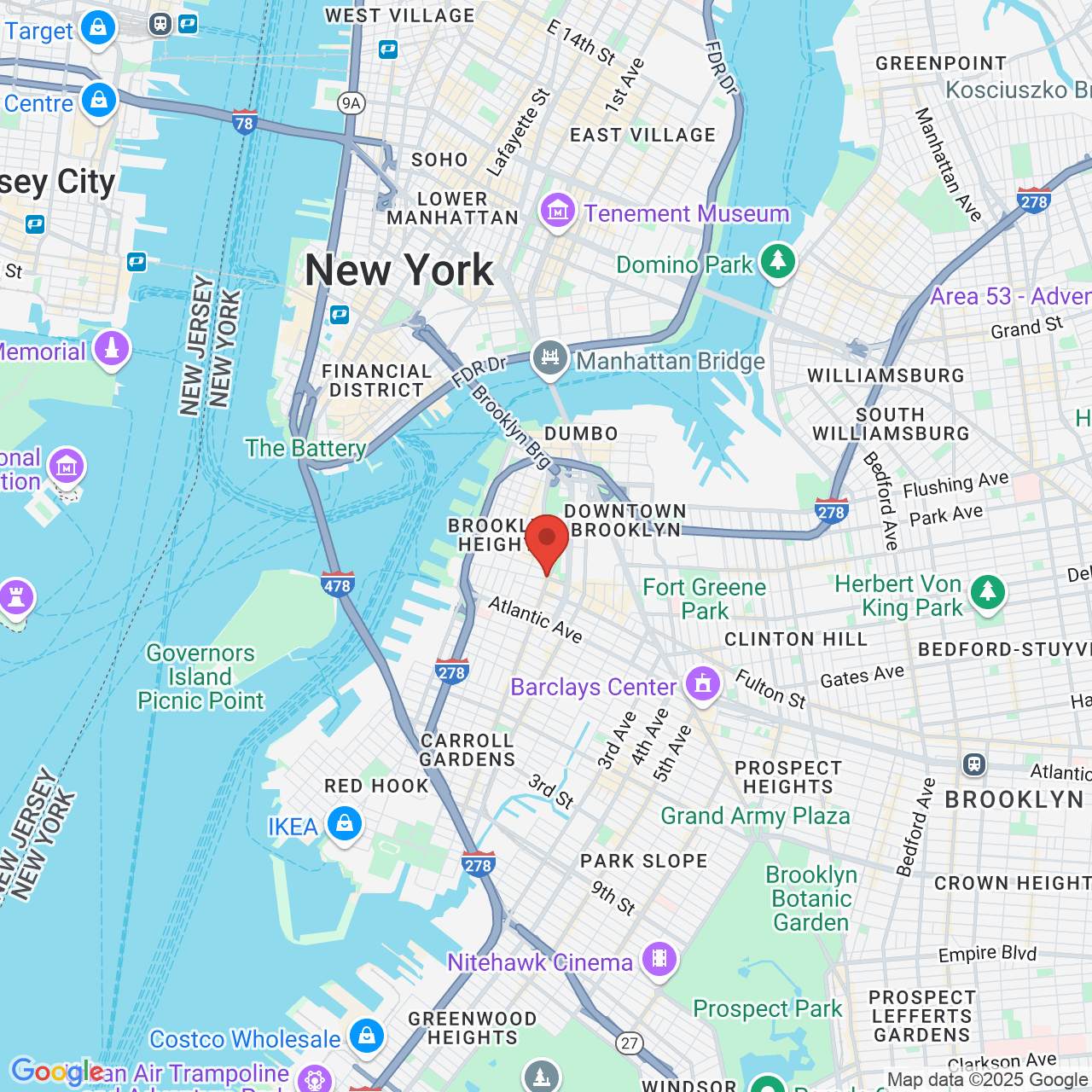
TMJ Disorders
What is TMJ Disorder?
Temporomandibular joint disorder (TMD) is an umbrella term for conditions that affect the joints of your jaw. The temporomandibular joints are the pivot points of your jaw and the source of all its motion. Each jaw joint contains a shock-absorbing disc that ensures smooth movement as you speak, swallow, and chew. TMD is characterized by strain and inflammation of the jaw joints resulting from conditions such as a slipped cartilage disc, injured bones, strained muscles, and other issues.

Symptoms of TMJ Disorder
Temporomandibular disorders can be extremely challenging for patients and their healthcare providers since it shares many symptoms with other conditions. The trained dental professionals at Brooklyn Heights Dental® can accurately diagnose TMD. Common symptoms include:
- Pain or tenderness near the TMJ
- Swelling on the sides of the face
- Headaches or earaches
- Ringing in the ears (tinnitus)
- Sleep apnea and snoring
- Back, neck, or shoulder pain
- Trouble fully opening or closing the jaw
- Trouble speaking or chewing
- Dizziness or vertigo
- Pain or pressure near your sinuses
- Clicking, grating, or popping noises from the jaw
How to Locate the TMJ
Here’s a small exercise that you can try right now to find your temporomandibular joint.
From where the jaw ends, move your fingers up to touch the base of your ears.
Try opening or shifting your jaw and feel around the area with your fingers.
Your TMJ is near the spot where your jaw moves most at the base of your ear.
Modern and Responsive While Treating Dental Conditions, We Treat You Like Family
They were absolutely fabulous. I would give them 10 stars if I could. I am actually LOOKING FORWARD to my next appointment and in general getting the whole large ball rolling in transforming my smile. I highly recommend anyone to seek them out. Especially someone with a fear of dentistry like me. Simply a transforming experience. And you can quote me on that!!
View on GoogleI was floored when the doctor came into the waiting area and greeted everyone. Never had that experience. I can say that Dr. Stanislaus was one of the best professionals I have ever met, and his “bedside manner” and approach to a patient should be an example to more medical and dental students, it was amazing. His office staff was excellent!
View on GoogleRequest an Appointment Consult the Experts at Brooklyn Heights Dental®
Dr. Lisa Reid and Dr. Eugene D. Stanislaus have decades of combined experience and knowledge to provide the best treatment for TMD. If you experience any symptoms such as limited jaw movement or tenderness around your TMJ, schedule an appointment with Brooklyn Heights Dental® immediately. We serve Fort Greene and nearby Brooklyn, NY, neighborhoods from our office in Brooklyn Heights.
Call us to request a TMJ consultation at:
(718) 857-6639
or

Benefits of TMJ Treatment
Relieve Pain
A TMJ disorder can lead to other painful conditions like migraines, ear pain, and tension headaches. By diagnosing TMD and treating it, we can relieve you of pain and discomfort that other treatments may not fix.
Improve Your Quality of Life
By limiting the movement of your jaw, TMD can decrease your quality of life. Our various TMD treatments can help you regain your full range of motion for normal, everyday tasks like chewing and speaking.
Prevent Future Issues
A TMJ disorder can wear down your teeth and increase your risk for dental problems like cavities. By treating TMD now, we can stop health issues like teeth grinding (bruxism) that may lead to more restorative treatments down the line.
Surgical Treatment Options
Arthrocentesis
Arthrocentesis is a minimally invasive treatment in which our doctors use a small needle to flush debris out of the temporomandibular joint. This treatment can remove anything stuck in the jaw joint (e.g., excess scar tissue) that may impair your movement. Our doctors may inject lubricant or medications to treat the joint. We can usually do this procedure at our office in Brooklyn Heights, NY.
Arthroscopy
Arthroscopy is a procedure in which our dentists can remove damaged or loose tissue and realign the temporomandibular joint. We use a tiny camera to view the TMJ and treat the area through a small incision. This technique minimizes your recovery time and scarring while providing increased comfort and safety. This treatment is typically performed in an outpatient hospital.
Open-Joint Surgery
Also known as arthroplasty, open-joint surgery involves exposing the TMJ to realign the joint, remove tissue, or repair the discs. Doctors can use open-joint surgery to treat scarring and worn tissue, or remove dislodged bone chips or growths such as tumors. Open-joint surgery is usually performed at outpatient hospitals around Brooklyn.
"Attention, Care, and Patience" For Patients All Over Brooklyn, NY
I had a great experience at Brooklyn Heights Dental. I generally hate going to the dentist but this was an efficient and easy visit. I did not wait long to be seen, and the staff was extremely welcoming and kind. The hygienist was very empathetic to a couple sensitive areas, and I had a very pleasant experience. Highly recommend.
View on GoogleI have anxiety when receiving dental care which does not make getting treatment easy. Can’t believe my fortune in finding Brooklyn Heights Dental and Dr Stanislaus. My experience was positive, thorough and pain free. The office is clean and modern; the entire staff is professional and polite. I appreciate the attention, care and patience for my situation.
View on GoogleLearn More About Your Treatment Options Serving Fort Greene and Brooklyn Heights, NY
Dr. Eugene D. Stanislaus or Dr. Lisa Reid will recommend treatment options to match each patient’s unique needs and symptoms. The team at Brooklyn Heights Dental® can address any concerns or worries you may have in a TMJ disorder appointment. To request a consultation, call our office at:
(718) 857-6639
or

Why Choose Us?
Sedation Dentistry

We offer sedation dentistry techniques, including nitrous oxide (laughing gas) and IV sedation, to minimize any pain or discomfort. IV sedation places patients into a relaxed state where they won’t remember the procedure, while nitrous oxide can be administered in addition to local anesthesia.
For the Entire Family

TMJ disorders and related injuries can impact someone regardless of their age. For example, adolescents may experience physical trauma from a sport, or have trouble with teeth grinding and clenching. We can treat these TMJ-related conditions with mouth guards, orthodontics, and other procedures.
Advanced Technology

We can use advanced 3D imaging techniques that show us bone structure, density, and tissue around the TMJ. This technology allows us to make faster and more precise diagnoses compared to traditional X-rays, which is especially useful for pinpointing the cause of TMJ and giving proper treatment.
Flexible Financing Options
"Absolutely Fabulous" Serving Fort Greene and Nearby Brooklyn Communities
The practice is very available for urgent problems. Even for my first appointment for a toothache, when I was not yet their patient, I was scheduled to be seen quickly. The dental practice is very modern – digitized xrays, 3D scanning for crowns, crown production, CAT scans for evaluation pre-implant. I’ve had a variety of procedures and they have all been done in the office.
View on GoogleI was able to get in same day for an unexpected procedure. The staff and Dr. Stanislaus were great. Professional, COVID safe, and I always felt like I knew what to expect for each part of the appointment. Dr. Stanislaus was kind, informative, and did not rush (which can be not so great for dental procedures). I will definitely be a returning client.
View on Google

